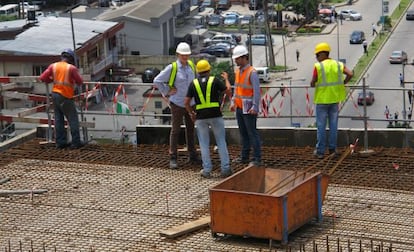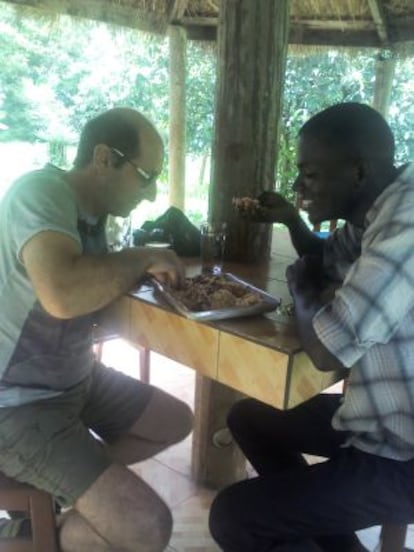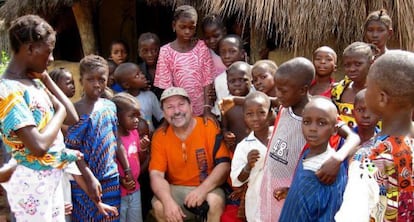The Spaniards defying ebola in Africa
Engineers, entrepreneurs and missionaries hope that safety measures will spare them from virus

Around 500 Spaniards are living in the West African countries at the epicenter of the ebola virus: eight of them in Liberia, 36 in Sierra Leone, 160 in Guinea and 260 in Nigeria. Another 2,000 Spanish nationals reside in Senegal.
Some arrived here following business opportunities, others to find jobs. There are mining and cocoa entrepreneurs, engineers, architects, doctors, diplomats and personnel from European agencies.
To them, the ebola virus – which has already killed 1,552 people and infected 3,069 – is an everyday reality. Last month a Spanish priest who contracted the disease was flown back to Spain, where doctors fought to keep him alive for five days.
José Luis Fernández has been in Africa for the last six years. The Spanish real estate crash took him to Ivory Coast first, then to Liberia, the country that has been hardest hit by ebola and where 83.8 percent of the population lives on less than €1 a day, according to the United Nations.
“There isn’t a soul on the streets,” he says, speaking from the capital, Monrovia. Entire neighborhoods have been quarantined, and the government has declared a night curfew.
Yet this Basque businessman does not fear becoming part of the statistics. His only concern right now is keeping his business alive. Fernández imports construction material, but the ebola virus has slowed work down to a crawl.

“Many offices are closed, and others are working at half the usual speed,” says Fernández, 49, who is currently dealing with the paperwork involved in taking a container worth €35,000 out of the port.
The toughest part, he says, is hearing his two daughters constantly asking him to return home. “But I say no; I tell them that I’m just getting the business started and we need money to eat. If malaria didn’t get me – and I’ve been sick three times already – neither will ebola.”
José Luis Garayoa, a 62-year-old from Navarre who has been in Sierra Leone for a decade, feels that ebola is just “another guest at the party.”
“The house is already full: malaria, cholera, typhus, dysentery ... These will not disappear just because another virus has come around.”
Garayoa has lost count of how many times he himself has fallen ill. “I’m up to about my 20th bout of malaria and I’ve completely lost track of the typhoid fevers,” he explains over the phone. Garayoa is a missionary with the Augustine Recollects religious community, and he works in the small villages of Kamabai, in the north of the country.
During his time here he has helped build 17 schools and 50 water wells; he also mediates between the local population and the Spanish doctors he brings in. Garayoa returns to Spain every year to undergo medical checkups, but he has no plans to leave Sierra Leone.
Meanwhile, in Nigeria, expats do not stay very long. “It's not very safe and life is very monotonous. Leisure time means exclusively meeting friends for lunch,” says Alejandro Corredor, 33, a technical architect who has been in Lagos for two years, helping erect the city’s tallest skyscraper.
After the ebola virus was introduced into the country by Patrick Sawyer, an American-Liberian doctor, Corredor began taking safety precautions.

“I watch my personal hygiene and keep my distance from other people, but I don’t have the sense that I’m in danger,” he says. “For now I have no plans on leaving.”
Corredor and his Polish girlfriend live in Victoria Island, the city’s financial center and “a golden cage,” as he himself describes it. On weekends he meets up with the 30 or so other Spaniards in the city, and if it’s a nice day, they go to the beach.
Since the ebola virus took hold in Nigeria, the Belgian company he works for has handed out information detailing the safety measures that need to be taken, such as not eating bush meat (monkeys, bats or rodents), using disinfectant, restricting travel and calling the company doctor before going to the hospital. On Tuesday, for the first time, Corredor had his temperature checked at work.
David Verges had been unemployed for nearly two years. The 43-year-old Catalan engineer knew that he wanted a job in his industry, and was not ready to work as a waiter in Spain. For the last two months he has been in Kankan, in the eastern region of Guinea, working on the construction of a 80-kilometer road to Mali. All he knew about ebola was what he had read in the papers, and he admits that before traveling to Africa it all sounded “like a movie.”
Now that he is there, he has learned to live among buckets of water and disinfectant, a constant presence at most bars and hotels. He only drinks bottled water and cooks all food thoroughly.
“There are six Spaniards on the team, we get paid well and everything is included except for food,” says Verges, who admits to feeling privileged in a country where 68 percent of the population lives in extreme poverty.
Tu suscripción se está usando en otro dispositivo
¿Quieres añadir otro usuario a tu suscripción?
Si continúas leyendo en este dispositivo, no se podrá leer en el otro.
FlechaTu suscripción se está usando en otro dispositivo y solo puedes acceder a EL PAÍS desde un dispositivo a la vez.
Si quieres compartir tu cuenta, cambia tu suscripción a la modalidad Premium, así podrás añadir otro usuario. Cada uno accederá con su propia cuenta de email, lo que os permitirá personalizar vuestra experiencia en EL PAÍS.
¿Tienes una suscripción de empresa? Accede aquí para contratar más cuentas.
En el caso de no saber quién está usando tu cuenta, te recomendamos cambiar tu contraseña aquí.
Si decides continuar compartiendo tu cuenta, este mensaje se mostrará en tu dispositivo y en el de la otra persona que está usando tu cuenta de forma indefinida, afectando a tu experiencia de lectura. Puedes consultar aquí los términos y condiciones de la suscripción digital.








































